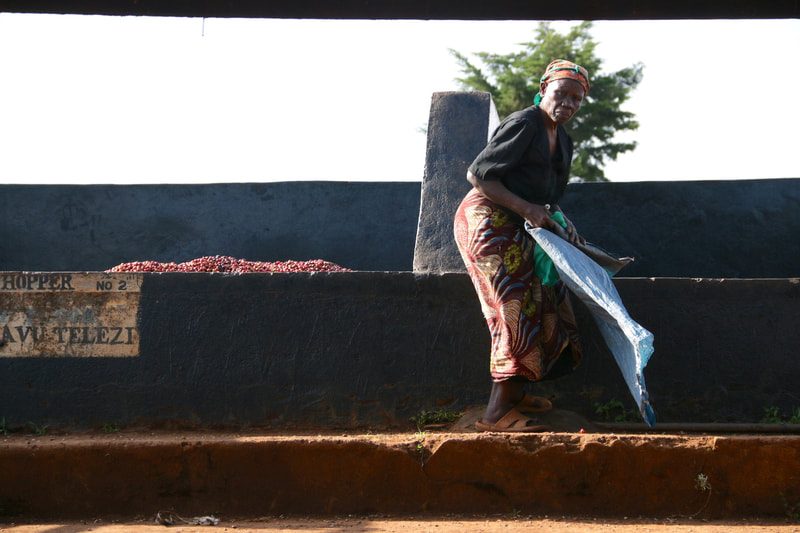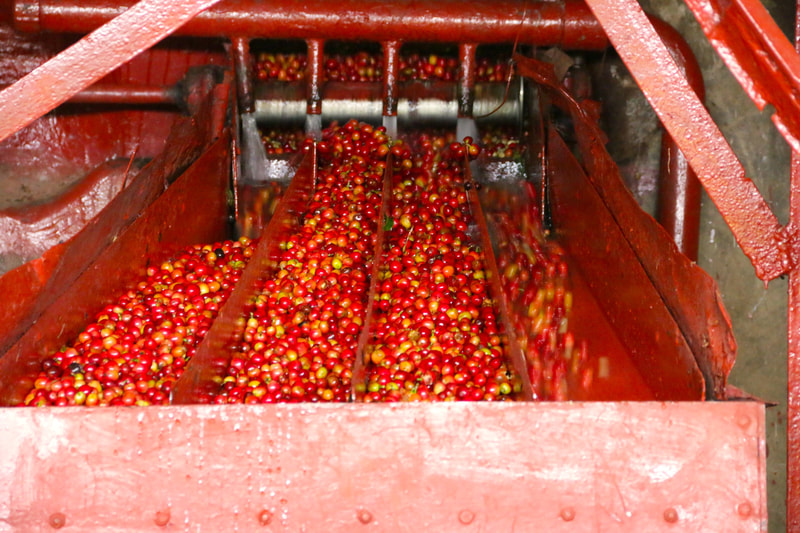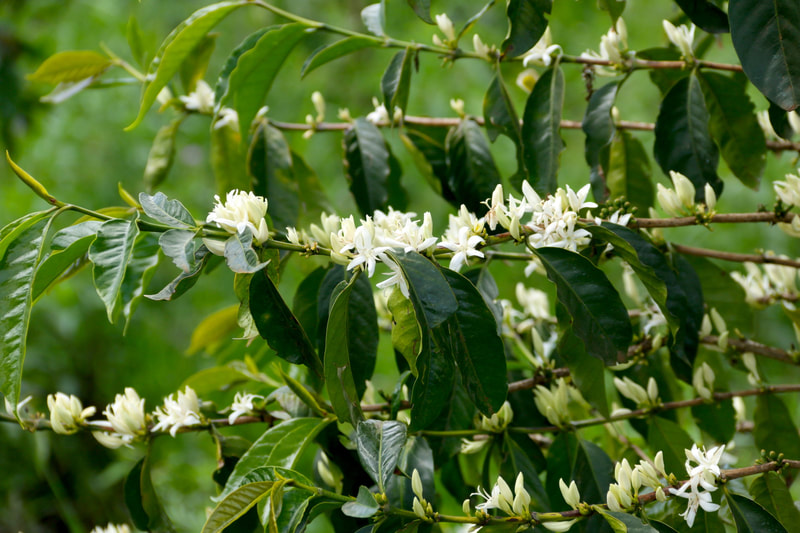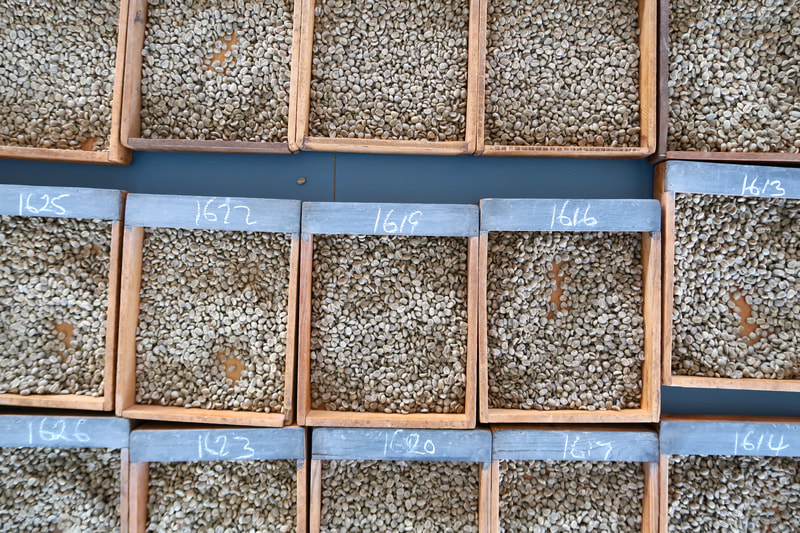KENYA Nyeri AB
General Information
|
Origin: Kenya
County: Nyeri Cooperative: New Gikaru FCS Washing Station: Various Farmers: 3800 active members (1444 female, 2356 male) Cultivar: SL28 - SL34 - Ruiru 11 (Grafted with SL 28) Altitude: 1633 masl Process: Fully washed with double fermentation Harvest: November 2021 - January 2022 Cherry Price | FOB Price: 4.60 USD/kg | 7.79 USD/Kg Screen | Moisture | Density: 15-16 | 10.6% | 0.722 g/ml Packaging: 60 Kg with GrainPro Score: 86.5 Notes: Orange, cinnamon, apricot, balanced |
TRACEABILITYThe New Gikaru Cooperative Society is located in Mukurweini, Nyeri County. The area is located in an area of high potential, with agriculture being the main economic activity. The area is mountainous with a favorable climate that receives moderate rainfall throughout the year.
The New Gikaru Co-operative Society was registered under the Cooperative Societies Act in the year 1965 and split from Mukurwe-ini FCS in 2000 to join Gikaru, which later became New Gikaru F.C.S. It has approximately 3,800 members (small coffee growers), who cultivate a total of 561 hectares of land and produce 461,122 kg of green coffee annually. Coffee is the main activity, but there is great potential for other economic activities such as fruits, vegetables, macadamia nuts and bananas, which also do well. The company is a coffee producing and trading entity with four factories, namely Ichamara, Mutwewathi, Kiuu, Kahuro and Thangathi. This lot is a regional blend, which brings together various factories of the New Gikaru FCS. In the cup, succeeds in reflecting the best organoleptic features of a good coffee grown in Nyeri County. IS 1 USD PER 1 KG OF CHERRY POSSIBLE?Things are changing for the better in Kenya, the average price of coffee cherries has increased from USD 0.45 per kg of cherry in 2016/2017 to USD 0.80 per kg of cherry in the year 2020/2021, a 78% grow! But what has happened in the year 2021/2022?
According to information from the Nairobi Coffee Exchange (NCI), coffee production increased by 64% in the 2021/2022 harvest, compared to the previous year, and income increased by 90% in the same period. This is the result of a lower supply to the global market, because in Brazil, the harsh weather conditions caused up to 20% of the entire harvest to be lost in the last season. And in Ethiopia, the world's fifth largest producer, agricultural activities have been interrupted by the conflict between the government and the militia in the Tigray region. Various Cooperatives of Coffee Producers in Kenya have announced the highest payment rates in history, which in some cases of cooperatives in Nyeri reach USD 1.10 per kg of cherry. This has generated excitement in many coffee growers, increasing the average production per coffee tree from 0.9 kg to 3 kg, which is still low, if we compare it with Latin American origins. In the case of the cooperatives with which we are working this season, we have found that the best payment reaches USD 1.06 per kg of cherry in Kagumoini factory and the worst USD 0.82 per kg of cherry for the New Murarandia factory. Our goal of reaching 1 USD per 1 Kg of cherries is getting closer, and we hope that it will be a widespread achievement for the entire Kenyan industry and serve as an example for other origins in Africa and the world, where payments per Kg of cherries they are much lower than in Kenya. A particularly worrying case is that of Burundi, where only USD 0.16 is paid for 1 kg of cherries. WHY FARMERS ARE GRAFTING RUIRU 11 WITH SL 28?Grafting is a horticultural technique whereby plant tissues are joined together to continue growing together. The upper part of the combined plant is called the stem, while the lower part is called the rootstock.
The Ruiru 11 variety was released in 1985. The name of the variety has the prefix "Ruiru" which refers to the location of the Kenya Coffee Research Station where the variety was developed. The variety is not only resistant to CBD and CLR, but is also compact, allowing farmers to intensify production per unit of land. The cultivar SL 28 was selected at the former Scott Laboratories (now the National Agricultural Laboratories, NARL located in Kabete) on the basis of a single tree, of the drought resistant variety Tanganyika selected in northern Tanzania in 1931. The prefix SL in the strain name stands for Scott Laboratories where the strain was selected. The variety is suitable for medium to high altitude coffee growing areas. In an attempt to change "low organoleptic reputation" of Ruiru 11, farmers are grafting it with SL28. For the lower part, they use the root of SL 28 which is much longer than that of Ruiru, and it can absorve more nutrients from the fertile Kenyan volcanic soils. For the top part, they use Ruiru 11, which is more resistant to coffee diseases than SL. They do this to gain the best of both worlds, the cup quality of the SL, with the strength and productivity of the Ruiru 11. |
THE NAIROBI COFFEE EXCHANGE
nEW GIKARU FCS LOCATION
|
WHERE WE ARE
Barcelona, Spain Santiago, Chile Budapest, Hungary |





